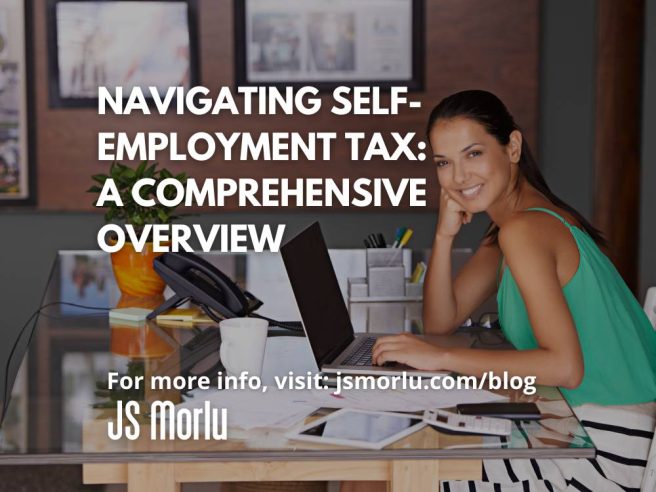Are you self-employed? If so, navigating the world of taxes can be a complex and daunting task. One of the most crucial aspects to understand is self-employment tax. Unlike traditional employees who have Social Security and Medicare taxes withheld from their paychecks, self-employed individuals are responsible for paying both the employer and employee portions of these taxes. This blog post will delve into the intricacies of self-employment tax, explaining who is required to pay it, who is exempt, and some special situations to consider.
What is Self-Employment Tax?
Before diving into specifics, it’s crucial to understand what self-employment tax entails. Governed by the Self-Employment Contributions Act (SECA), this tax requires individuals earning income directly from their business activities, rather than as employees, to contribute to Social Security and Medicare.
For 2024, the self-employment tax rate is 15.3%, which includes:
- 12.4% for Social Security on the first $168,600 of net earnings.
- 2.9% for Medicare on all net earnings.
Additionally, an extra 0.9% Medicare tax applies to SE income above:
- $250,000 for married couples filing jointly
- $125,000 for married individuals filing separately
- $200,000 for others
Who Owes Self-Employment Tax?
While many self-employed individuals are subject to self-employment tax, there are specific categories of taxpayers who typically fall under this umbrella:
- Sole Proprietors and Independent Contractors: If you operate your own business or offer services as an independent contractor, you’re likely responsible for self-employment tax on your net earnings.
- Partnerships: Partners in a partnership generally owe self-employment tax on their share of the partnership’s income.
- Limited Liability Companies (LLCs): Depending on how the LLC is structured, members might be subject to self-employment tax on their share of the LLC’s profits.
- Clerics: Ministers and other clergy members are generally subject to self-employment tax unless they’ve taken a vow of poverty.
Who is Exempt from Self-Employment Tax?
While the majority of self-employed individuals will owe self-employment tax, there are some exemptions and special cases:
- Employees: Traditional employees who receive W-2 forms are not subject to self-employment tax as their employers withhold these taxes.
- Rental Income: Generally, rental income is exempt from self-employment tax unless you’re actively involved in managing the property and providing services to tenants.
- Limited Partners: In some cases, limited partners in a partnership might be exempt from self-employment tax if their involvement in the business is minimal.
- Corporate Owners: Owners of corporations, including S corporations, typically don’t owe self-employment tax on their share of the corporation’s profits. However, they must pay themselves reasonable compensation subject to regular employment taxes.
- Religious Exemptions: Certain ministers, Christian Science practitioners, and members of religious orders who have taken a vow of poverty might qualify for an exemption.
- Notary Publics: Fees earned as a notary public are exempt from self-employment tax.
- Nonresident Aliens: The rules for nonresident aliens and self-employment tax can be complex and depend on factors like tax treaties.
- Occasional Income: Income from a one-time or infrequent activity typically isn’t subject to self-employment tax.
Special Considerations for Self-Employment Tax
There are a few additional factors to consider when dealing with self-employment tax:
- Self-Employment Tax Deduction: Self-employed individuals can deduct half of their self-employment tax when calculating their adjusted gross income. This deduction helps offset the burden of paying both the employer and employee portions of the taxes.
- Optional Methods: If your net self-employment income is below $400, you might be eligible for optional methods of calculating self-employment tax. These methods can help you build Social Security credits even in low-income years.
Navigating the Complexities
Understanding self-employment tax is essential for anyone who earns income outside of traditional employment. While many self-employed individuals are responsible for paying this tax, there are exemptions and special circumstances to consider. For personalized advice on how self-employment tax may apply to your situation, contact our office.
Stay informed and proactive to ensure compliance and optimize your financial planning.
JS Morlu LLC is a top-tier accounting firm based in Woodbridge, Virginia, with a team of highly experienced and qualified CPAs and business advisors. We are dedicated to providing comprehensive accounting, tax, and business advisory services to clients throughout the Washington, D.C. Metro Area and the surrounding regions. With over a decade of experience, we have cultivated a deep understanding of our clients’ needs and aspirations. We recognize that our clients seek more than just value-added accounting services; they seek a trusted partner who can guide them towards achieving their business goals and personal financial well-being.
Talk to us || What our clients says about us


